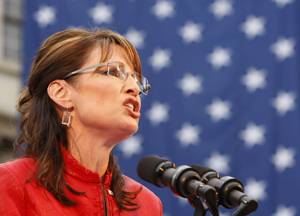OPOIEN: Palin faces sexism she created

Republican vice presidential candidate Alaska Gov. Sarah Palin speaks at a rally in Media, Pa., Monday, Sept. 22, 2008. (AP Photo/Gerald Herbert)
September 22, 2008
On Sept. 13, Tina Fey made a special appearance on Saturday Night Live’s season premier, joining Amy Poehler in a sketch satirizing Sarah Palin and Hillary Clinton. The sketch portrayed the two women delivering a nonpartisan message aimed at eliminating sexism. In classic fashion, SNL poked fun at both politicians, using less-than-flattering Palin quotes and implying that Clinton was bitter about missing out on a chance at the White House.
Palin’s reaction to the sketch? According to her spokeswoman, “She thought it was quite funny.” Yet, in an MSNBC interview on Sept. 15, John McCain’s top economic adviser Carly Fiorina said that the sketch was “dismissive of the substance of Sarah Palin,” “disrespectful in the extreme,” and “sexist.”
Wait a second — SNL was disrespectful to a politician? They’ve never done that before. Remember the days of Gerald Ford, George H.W. Bush and Bill Clinton? Oh, wait, it seems Fiorina is taking humor a bit too seriously and using a term that has been thrown around much too casually throughout this presidential election. Now that Clinton is out of the running, Palin’s candidacy has brought sexism back into the spotlight — but is sexism as much of an issue in this election as it’s made out to be?
When Clinton entered the presidential race, politics and the media were shaken up with regard to gender issues. Amid discussion of the breakthrough Clinton made as the first female presidential candidate were analyses of her fashion choices, reports of McCain laughing when Clinton was referred to as a “bitch”, and a detailed description of her cleavage in a particular outfit. According to Dr. Dianne Bystrom, director of Iowa State’s Carrie Chapman Catt Center for Women and Politics, “Every academic study that I have seen which focuses on the media coverage of the 2008 presidential candidates shows that Hillary Clinton was covered differently than her male Democratic opponents. She was covered more negatively than her male opponents and often in sexist ways.”
Sexism undoubtedly created a hardship that set Clinton apart from other presidential candidates. Did it ruin Clinton’s campaign? Absolutely not. The cause of her campaign’s demise is debatable, but it can be attributed to negative campaigning, a strategy of inevitability and losses in the key “Potomac Primary” (Maryland, Virginia, and the District of Columbia), among other factors. According to CNN Associate Political Editor Rebecca Sinderbrand, “Policy contortions and unexpected reversals … hurt her. So did her reluctance to admit error.” Sexism, while a pertinent issue, was not her downfall.
Last March, Palin was asked about the double standard in the media’s coverage of Clinton. At the time, she offered this response: “Fair or unfair, I think she does herself a disservice to even mention it. I mean, you gotta plow through that. You have to know what you’re getting into … When I hear a statement like that coming from a woman candidate with any kind of perceived whine about that excess criticism, or maybe a sharper microscope put on her, I think, ‘Man, that doesn’t do us any good, women in politics, or women in general, wanting to progress this country.’”
What kind of double standard did Palin create for herself with that statement? Does the McCain campaign have the right to cry “sexism” in response to criticism directed toward Palin after she publicly denounced Clinton’s very mention of the word?
Palin is dealing with the same nature of offensive comments that Clinton faced during her campaign. Whether a woman is being called a “MILF” or being told to iron someone’s shirt, both women are subjected to sexist stereotypes. However, these stereotypes have little to do with their campaigns. The McCain camp didn’t accuse the media of sexism until Palin’s credentials were questioned. To quote the SNL sketch, “It is never sexist to question female politicians’ credentials.” If candidates want sexism to be taken seriously, they mustn’t throw the term around every time they hear something they don’t like.
Palin has asked the media to leave her family out of the spotlight. Yet on Sept. 2, a video on Meghan McCain’s blog featured a video with Palin’s 7-year-old daughter Piper saying, “Vote for my mom and John McCain.” If Palin wants her children kept from media scrutiny, the campaign shouldn’t allow the use of the kids in promotions like this video. The Obama campaign has shown similar inconsistencies in media coverage of his daughters. In July, Malia and Sasha Obama were interviewed by an Access Hollywood reporter, only to have Obama express his regret several days later, declaring his family “off-limits” during the election.
The McCain-Palin campaign also loses some credibility in its complaints of sexism by initially packaging Palin primarily as a hockey mom and wife. By focusing on her feminine qualities, the campaign opened the topic for discussion in the media. The McCain campaign drawing on the comfort and familiarity of motherly feminine stereotypes is just as sexist as the media discussing Palin’s past experience as a beauty queen.
If the campaign wants to use sexism to its advantage, it must also accept what it deems sexist attacks from outsiders. Sexism is relevant in this election, but it is too serious of an issue to allow a critical statement or act to be deemed sexist without considering all aspects of the situation.






